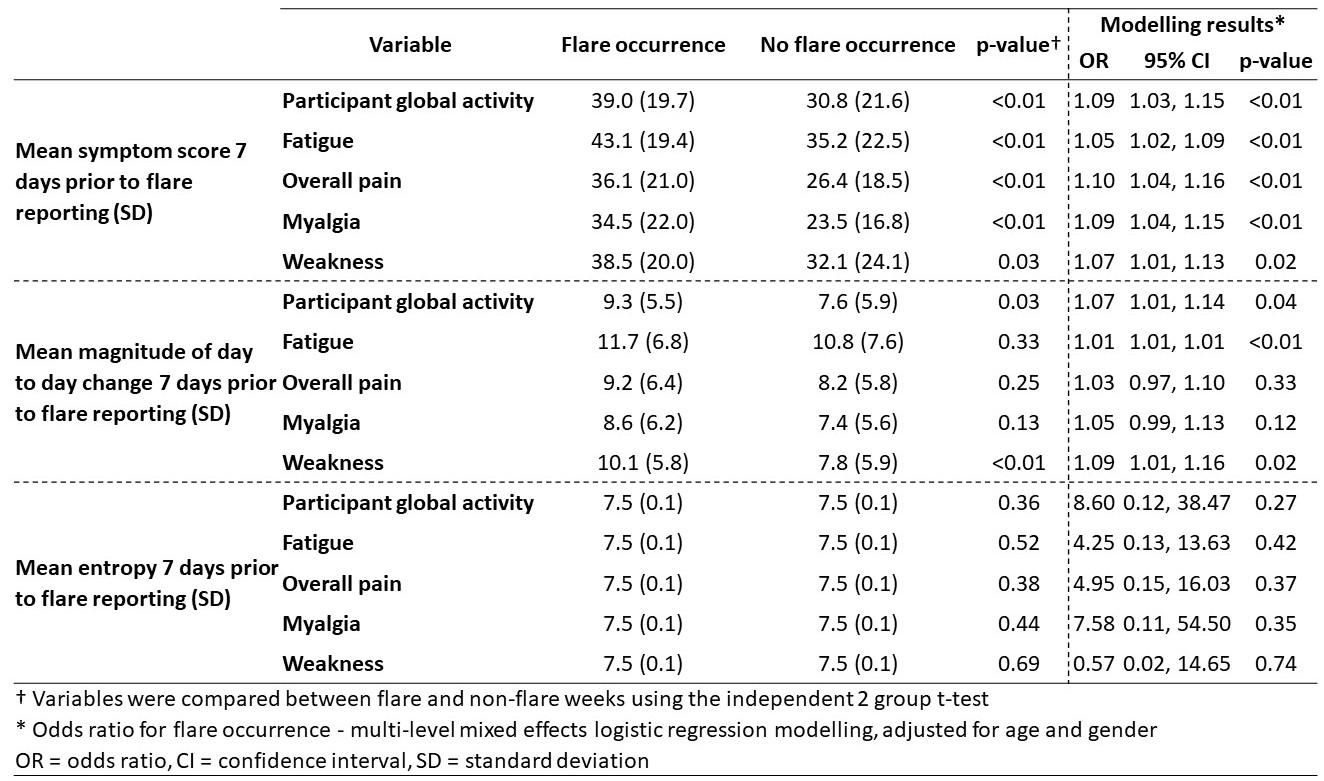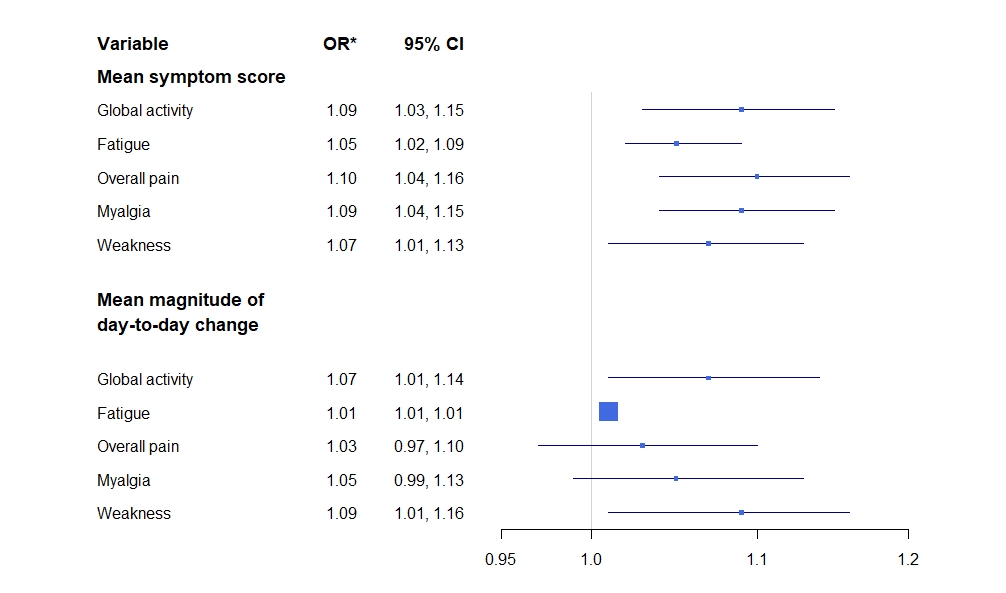Session Information
Session Type: Poster Session C
Session Time: 9:00AM-11:00AM
Background/Purpose: The concept of idiopathic inflammatory myopathy (IIM) flare is widely used, although no consensus definition exists. Studies have demonstrated the feasibility and utility of using tailor-made smartphone apps to collect daily symptom patient-reported outcome measurements (PROMs). This methodology allows researchers to investigate relationships between events, such as a flare, with changes of daily symptoms. Delineation of patterns of symptom changes associated with flares may provide a preliminary patient definition of an IIM flare and identify “digital biomarker” candidates.
This study aimed to use daily smartphone app-collected data to:
- Characterise the pattern of patient-reported flares in an IIM cohort
- Identify changes of daily symptoms associated with flares
- Identify IIM flare digital biomarker candidate variables
Methods: Data was collected via the Myositis Physical Activity Device (MyoPAD) study. Recruited participants (UK adult participants with a verified IIM diagnosis) answered PROMs every day of the 91 day study period via an IIM-tailored smartphone-based app. Daily symptom PROMs addressed 1) global activity, 2) overall pain, 3) myalgia, 4) fatigue and 5) weakness (0-100 visual analogue scale). Every 7 days, participants were also asked whether or not they suffered a flare (present/absent) via the app. To illustrate the daily symptom and weekly flare reporting, Figure 1 shows a single participant’s data over a 3 week period.
The following were calculated for each 7 day period prior to each flare question:
- Mean score of each daily PROM
- Mean magnitude of day-to-day change of each daily PROM (i.e. negative differences were multiplied by -1)
- Entropy (measure of variability) of each daily PROM
Multi-level mixed effects logistic regression models tested the relationships between flare occurrence and each above calculated measurement. This was subsequently adjusted for age and gender.
Results: 21 participants (67% female) took part in the study. The median age of the cohort was 50 years (IQR 43, 56) and median disease duration 3 years (IQR 2, 5). Engagement was high – a total of 22880 PROMs, 88% of a potential total 25977, were entered. Participants reported experiencing flares on a median of 3 weeks (IQR 2, 5) per participant, out of a possible 13. A total of 81 (31%) flares were reported across the cohort from 261 answered flare questions (4% questions not answered).
Modelling revealed that a higher score of each daily symptom PROM was significantly associated with flare occurrence (Table 1 and Figure 2). Higher magnitude of day-to-day change of participant global activity, fatigue and weakness were also significantly associated with flare occurrence. Flare occurrence was not significantly associated with entropy of any daily symptom.
Conclusion: This study has characterised the frequency of flare occurrence in an IIM cohort – flares were reported to occur one week in four on average. This study has also delineated daily symptoms associated with patient-reported IIM flares – particularly global activity, fatigue and weakness. Smartphone app collected daily symptom data may therefore provide digital biomarkers capable of predicting IIM flare occurrence and enable reactive treatment instigation.
 Table 1 – Summary and modelling results of daily symptom scores, day to day change and entropy, divided by flare occurrence
Table 1 – Summary and modelling results of daily symptom scores, day to day change and entropy, divided by flare occurrence
 Figure 1 – Three week extract (days 56 to 77 of 91 day study period) of single participant’s daily symptom PROM scores and flare occurrence. PROM = patient reported outcome measurement
Figure 1 – Three week extract (days 56 to 77 of 91 day study period) of single participant’s daily symptom PROM scores and flare occurrence. PROM = patient reported outcome measurement
 Figure 2 – Modelling results of mean symptom score and magnitude of day-to-day change over 7 day period prior to flare occurrence. OR = odds ratio, CI = confidence interval. * Odds ratio for flare occurrence – multi-level mixed effects logistic regression modelling, adjusted for age and gender.
Figure 2 – Modelling results of mean symptom score and magnitude of day-to-day change over 7 day period prior to flare occurrence. OR = odds ratio, CI = confidence interval. * Odds ratio for flare occurrence – multi-level mixed effects logistic regression modelling, adjusted for age and gender.
To cite this abstract in AMA style:
Oldroyd A, Yimer B, Little M, Dixon W, Chinoy H. Daily Myositis Symptom Changes Collected via a Smartphone-Based App Are Associated with Flare Occurrence – Providing Evidence of Potential Digital Biomarkers [abstract]. Arthritis Rheumatol. 2020; 72 (suppl 10). https://acrabstracts.org/abstract/daily-myositis-symptom-changes-collected-via-a-smartphone-based-app-are-associated-with-flare-occurrence-providing-evidence-of-potential-digital-biomarkers/. Accessed .« Back to ACR Convergence 2020
ACR Meeting Abstracts - https://acrabstracts.org/abstract/daily-myositis-symptom-changes-collected-via-a-smartphone-based-app-are-associated-with-flare-occurrence-providing-evidence-of-potential-digital-biomarkers/
